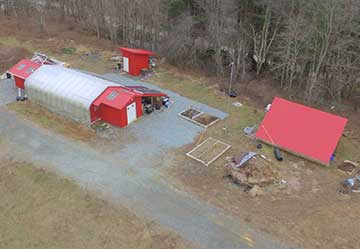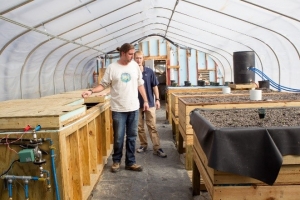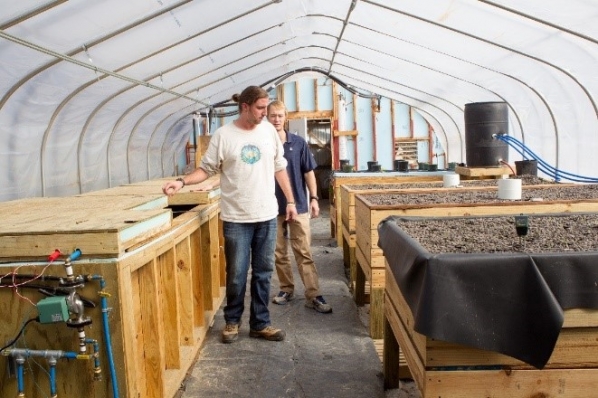Purpose and Vision: The NEXUS at Appalachian State University is a multidisciplinary team of faculty and students housed in the Department of Sustainable Technology and the Built Environment whose research lies at the intersection of agriculture, energy, and natural resources. The project has been funded by the Environmental Protection Agency and NC Department of Agriculture & Consumer Services since 2013. NEXUS is developing inexpensive and efficient biomass greenhouse heating technologies that provide affordable and sustainable means to improve the food-growing capacities and standard of living for farmer communities in rural Appalachia while reducing the use of fossil fuels. This is done by using on-farm biomass resources/wastes such as agricultural waste and wood chips to produce energy. Growing season extension with heated greenhouses increases the availability of local food throughout the year, expands available markets and increases farmers’ profits. NEXUS research on greenhouse heating systems serves community by enhancing access to fresh local produce, farmers by increasing their income throughout the year, and the local environment and economy by conserving fossil-fuel energy and expense while reducing greenhouse gas and smog emissions normally associated with greenhouse heating and transportation of non-local produce.
 The 20’ by 30’ greenhouse located at the Watauga County Landfill in Boone, NC includes an aboveground 1500-gallon water storage tank (thermal battery) and an aquaculture pond. It is supported by small-scale pyrolysis, anaerobic digestion, solar thermal, and compost heating technologies. Thermal mass (water in the thermal battery) is heated by these technologies and radiates heat to the greenhouse at night. Arduino module controls the flow rate of water from the tank to various heat exchangers based on temperature differentials. The pond also acts as a thermal storage, and holds/distributes heat to the greenhouse. These systems also produce high quality soil amendments (e.g., compost, digester slurry, biochar, and fish waste), which increase overall farm productivity. Our goal is to transfer the technology we developed at the greenhouse to a production farm. Working with cooperative farms, we plan to collect field data on economic benefits and agricultural productivity. In addition, we seek to better understand farmer’s perspective of this integrated system. Based on the data and results we learn, we will develop guidelines and standards for future business ventures and users.
The 20’ by 30’ greenhouse located at the Watauga County Landfill in Boone, NC includes an aboveground 1500-gallon water storage tank (thermal battery) and an aquaculture pond. It is supported by small-scale pyrolysis, anaerobic digestion, solar thermal, and compost heating technologies. Thermal mass (water in the thermal battery) is heated by these technologies and radiates heat to the greenhouse at night. Arduino module controls the flow rate of water from the tank to various heat exchangers based on temperature differentials. The pond also acts as a thermal storage, and holds/distributes heat to the greenhouse. These systems also produce high quality soil amendments (e.g., compost, digester slurry, biochar, and fish waste), which increase overall farm productivity. Our goal is to transfer the technology we developed at the greenhouse to a production farm. Working with cooperative farms, we plan to collect field data on economic benefits and agricultural productivity. In addition, we seek to better understand farmer’s perspective of this integrated system. Based on the data and results we learn, we will develop guidelines and standards for future business ventures and users.
Education and Research in Service to Community: NEXUS is a center for community and university-based education and research. Field days for local farmers to demonstrate biomass greenhouse heating and growing operations have already been held (e.g., NEXUS open house) and will be in the future. Local high school groups have visited the site for demonstrations. University students use the site for classroom demonstrations as well as their research. Faculty in collaboration with students and local industry and agricultural producers promote an environment of mutual instruction, investigation, learning and development among all partners.

